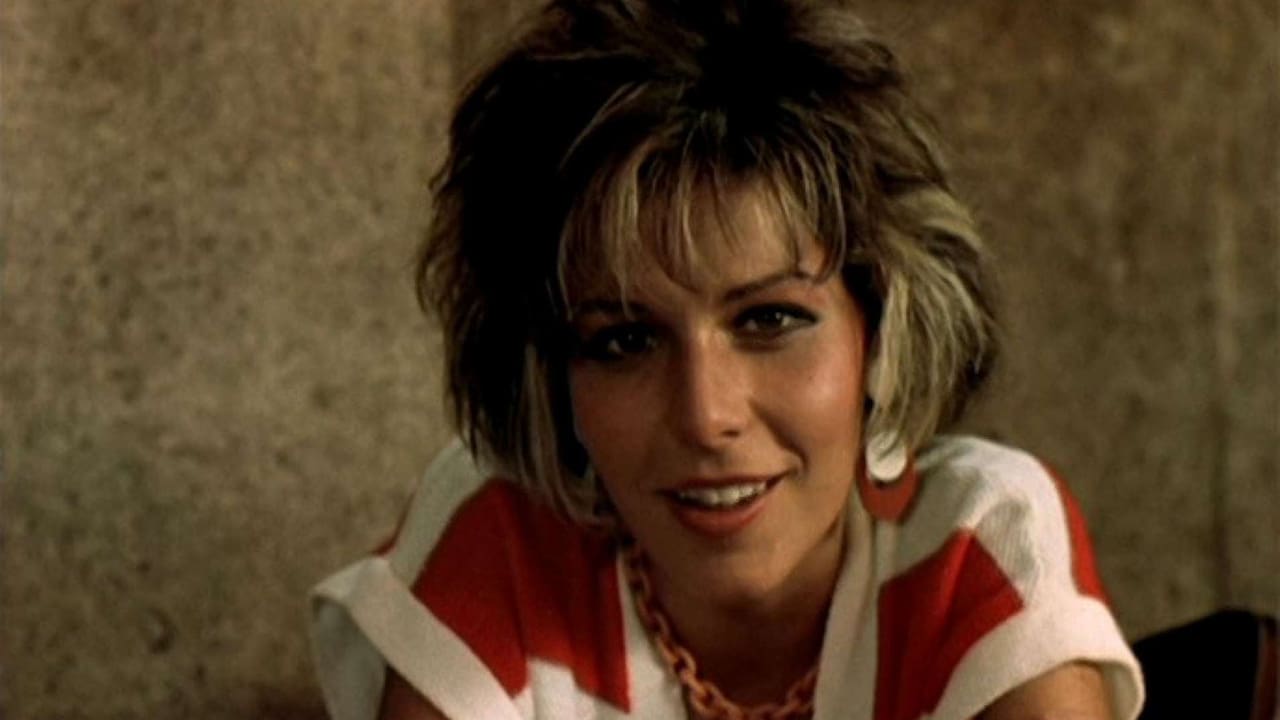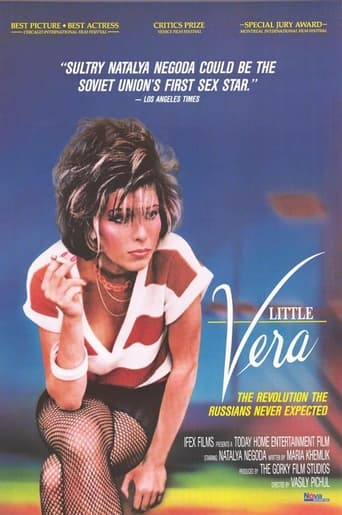



Brilliant and touching
Just intense enough to provide a much-needed diversion, just lightweight enough to make you forget about it soon after it’s over. It’s not exactly “good,” per se, but it does what it sets out to do in terms of putting us on edge, which makes it … successful?
View MoreAll of these films share one commonality, that being a kind of emotional center that humanizes a cast of monsters.
View MoreThere are moments that feel comical, some horrific, and some downright inspiring but the tonal shifts hardly matter as the end results come to a film that's perfect for this time.
View MoreThis once notorious drama (at least in its own country) was hailed as a breakthrough when first released simply for daring to show modern Soviet life without the usual State-approved propaganda halo, in all its actual anti-bureaucratic grubbiness. But watching the film on this side of the erstwhile Iron Curtain only reinforces the notion that Soviet youth culture is thirty years behind the rest of the world: despite the often oppressive details it might be just another quaint teen delinquency relic from early 1960s Hollywood, dubbed into Russian and updated with casual sex and drug abuse. In other words, it's hardly a revelation to discover that Russian kids are just as misunderstood by adults as their American role models. But while the attitudes may look dated to Western audiences, it's at least an honest attempt to portray something of the boredom and defiant posturing of youth, in a country not exactly noted for addressing its generation gap.
View MoreA gritty presentation of the decay of family values and human dignity in the wake of Soviet communism, Vasili Pichul's 1988 film Little Vera is a landmark film of modern Russian cinema. Pichul's brutal drama marks a strong departure from the images of sanitized idealism promoted in Soviet times (as in Aleksandrov's Circus), brashly moving the social chaos of his time into the public spotlight. A contemporary Ukrainian setting further intensifies the effect, first by the immediacy of the film to its time period, second by its utilization of a locale not only struggling for identity in lieu of a Soviet system, but also as a nation distinct from the Russian idiom that had dominated the U.S.S.R.Vera, the film's title character and protagonist, is a rebellious adolescent girl with a "dysfunctional" family including a hard-drinking father and a mother care-worn. Rejecting her would-be beau Andrei, Vera begins a destructive (and primarily sexual) relationship with a college student named Sergei. Despite her parents' dislike for the lazy Sergei, and despite Sergei's rude contempt for her parents, he moves into their cramped apartment. Tensions escalate until Vera's father drunkenly stabs Sergei. Vera must decide if she will stay loyal to her intolerable family by testifying her father acted in self-defense, or continue to support and defend the ever-detached Sergei. Unbearable in almost every imaginable way, Little Vera masterfully captures and communicates the inescapable void left in social life after the collapse of communism. The sexual aggressiveness of the film (it was the first film to show explicit sex) combined with the unrelenting presentation of social reality (a marked distinction from the socialist realism demanded by Stalin) effectively confronted the conditions of former-Soviet life. Most interesting, however, was public reception. While many wrote hate mail to the director and star, the film was wildly popular. Here the double-edged nature of "film as social criticism" emerges: if done correctly, the film will make the audience uncomfortable. Because no easy solution presents itself, some viewers will hate the film and filmmakers for "bringing up" the issue. Many films come to mind as somewhat comparable in this regard: Larry Clark's Kids, Harmony Korine's Gummo, even popular movie's such as John Hughes' Breakfast Club. I recommend this film to those viewers for whom the prospect of nearly two hours excruciating domestic conflict and social miasma is not overly daunting. The film is absolutely beautiful, and incredibly challenging. Despite the difficulties of watching the film, some moments within it are profoundly beautiful. Of course, the socio-historic and cultural significance of the film cannot be overlooked, and in fact operate as an even more assertive reason for watching this film.
View MoreIt is difficult, today and in the US, to understand this movie. We have nothing, really, to compare it with. Here is an attempt at comparison: It is as if during the last years of Saddam's rule, a filmmaker in Iraq were somehow able to make a film, which, for the first time ever, showed life as it really was lived in that country. The life of ordinary young girl, with all the terror and the repression full blown. Then the film was exhibited freely in Iraq. If you could imagine that unlikely event, then you might have an idea of what went on with this film in the last few years of the Soviet Union. Prior to this film, Soviet cinema was highly censored. Soviet movies would only show an ideal life in the worker's paradise. Then suddenly this. The alcoholism, the random sex, the ugly wasteland that was the Soviet city, the choking pollution, the proletariat victimizing each other and themselves, the utter hopelessness - it is all there. People were stunned. Soviet women would often weep during the showings. Many would say that this is the story of their lives. It was a cultural earthquake the like of which filmmakers only dream of accomplishing. It undoubtedly hastened the breakup of the Soviet Union. Reading the reviews here, I can see that few understand this film. One says it was groundbreaking because it contained real sex. To the Soviet viewers at the time, the sex was a minor event compared to fact that it portrayed reality for the first time in Soviet cinema. Others compare it to current films such as "As Good as it Gets" Might as well compare Homer's Illiad to the latest John Grissam novel. They simply do not compare. This is not just a film, this is was a social document, and a transforming social force. It needs to be viewed that way or you will not understand the film. Other reviewers see it as a film about a dysfunctional Russian family. One even says that it is difficult to feel sorry for Vera because she keeps coming back to her family. The point is that Vera and her family are symbols for all of Soviet life. There was nowhere else to go, because the family down the block and in the next town were the same. This was life in the Soviet Union for most people. This is a film that can be viewed on many levels: as a drama it traces the landscape of despair, as a social document it shows the living conditions of the time, as a political document it shows the attitude of the people and many of the reasons for the break-up of the Soviet Union, and as a moral document it shows the evils of a dictatorship that is out of control, and the cruelties that victims will practice on each other. Little Vera clearly shows the human toll that Socialism eventually takes on its victims, despite any good intentions that system may have. In doing so it helped end the Soviet regime thus contributing to one of the major changes in modern history. This film achieves what only a few films have ever accomplished. It is not only an stunning representation of history but it also become a force in that shaped history.
View MoreFirst of all this movie is a piece of reality very well realized artistically. Some kind of combination between "American Beauty" and "As Good as it gets". And of course something specifically to all Russian movies ( of course the valuable one, no dirty propaganda !) : the problem of loneliness of man ... Especially recommended for the people which really want to see beyond all vomitive propaganda about communism ( both positive or negative propaganda ! ). A movie about common people, their problems, lack of satisfactions - especially for young ones, fear when touch the real and too dirty face of the society ... and about the fake "solutions" : alcohol and violence ... and probably the only real solution : true love ... Of course it's very well "located" in the space and time of "Russian perestroika" but it's valid for all the society ( except a perfect one, but don't worry - not possible to find this on our Earth !). For the last time - definitely recommended ...
View More